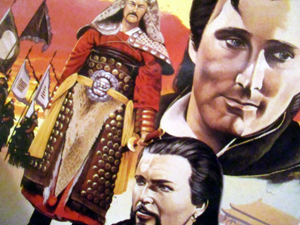Marco Polo
“Gracious maidens, gentle lords. Pray attend me while I tell my tale…” – Lady Ping Cho
This is the first of the ‘lost’ episodes so this review is based on the shortened reconstruction available on DVD and more detailed transcripts of the audio of the story. It’s truly a shame that this particular story is one of the ones that was erased and unrecovered. Not only is it significant for being the first true historical of the series, but it is also known to be one of the most elaborately costumed and richly decorated episodes in the show’s early years. The existing pictures show ornate designs of flowing robes and silks, striking palace woodwork, and calligraphied wagons among other things.
Of all the stories of Doctor Who, this is one of the few that very obviously seeks throughout to fulfill the original program mission of providing education—there’s an overview of the history of Marco Polo as he recounts his life to Barbara, a discussion of various customs and geography of the region, and even Ian giving Polo simple scientific explanations for things like the effects of low oxygen at altitude and the process of condensation. It’s interesting to see them try to fit all of this into the context and flow of the story—to the point that some of the plot feels like it’s introduced just to be a history lesson.
As for the story itself, it’s rather unique in stretching over a long period and having much of that time covered by voice-over narration as Marco Polo writes in his journal. It’s not a devise often used in the show but seems to work here. It’s almost humorous imagining the historical Polo pouring out his frustrations with the crotchety First Doctor in his diary. (“To make matters worse, the old Doctor continually shows his disapproval of my action by being both difficult and bad-tempered. For three days now, during which time we have covered no more than thirty miles, I have had to endure his insults.”) The story moves along in the stages of the caravan’s journey—with political machinations of characters driving half the story and the personal peril of our heroes caught up in it driving the other—and covers a rather wide territory.
The characters are very effective: Tegana oozes menace and yet somehow maintains a false dignity that gives believability to the group’s acceptance of his authority. Marco Polo seems the hero of the piece yet it’s his selfishness that is putting the TARDIS crew most in danger. He redeems himself by recognizing that later. There are a lot of colorful side characters as well—some serious, some comic. Ping Cho and Susan’s bonding and friendship over the loss of home and family is particularly nicely portrayed, especially in Susan’s frank willingness not to press Ping Cho to break a promise, even though it would help them escape, and in Ping Cho’s willingness to find a way to work around the promise and sacrifice her safety so at least one of them can find home. (It’s also a bit interesting that Susan seems to confirm here that she actually is only 16 years old.) We also see what will become a familiar character trait of the Doctor’s start to emerge in his playful banter with the elderly Khan over a game of backgammon, adding to his later tales of hobnobbing with kings.
There are many nice moments and lines in this story—I love Marco Polo’s description of time-travel when Ian tries to convince him that they are from another time: “You are asking me to believe that your caravan can defy the passage of the sun, move, not merely from one place to another, but from today into tomorrow, today into yesterday?” There is also some nice foreshadowing in would-be assassin Tegana’s musing over chess: “I find it a fascinating game of strategy of war. Two equally balanced armies deployed upon a field of battle, and each commander determined to be the one who cries “Shahmat”….the king is dead.” There are even several truly funny lines—from Marco Polo’s sardonic comment while handing a sword to the Doctor (“ If you’re half as aggressive with this as you are with your tongue, Doctor, we can’t lose.”) to the hilariously understated irony of Kublai Khan’s report of the Ping Cho’s suitor (“Your beloved husband-to-be, so anxious to be worthy of your love, drank a potion of quicksilver and sulfur, the elixir of life and eternal youth—and expired.”)
Best unsettling moments:
It’s hard to get a feel for any suspense this episode may have had without being able to watch it in action, but Barbara’s capture and narrow escape certainly takes on a chilling realness in her breakdown at describing the ordeal: “That dreadful man… There were four of them… They played dice to see who’d kill me. That dreadful man… and he won… he won…”
Firsts:
- Historical story and famous historical figures
- The Doctor playing a game of strategy
- Lost episode 🙁
Regrets:
As I’ve said, it’s very regrettable that we don’t have a copy of this episode to see its costumery and sets. (Yet? We can always hope it’ll turn up one day!)

